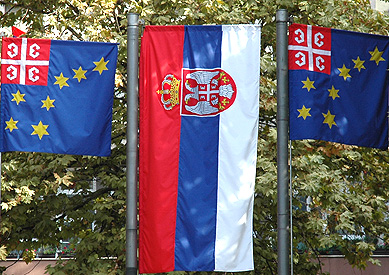
|
Always striving to preserve its Christian faith, the Serbian nation has for centuries endured many sufferings, beginning with the agonizing swords of Islamic conquerors, the Fascist aggression, right up to the barbaric bombing by the NATO countries that now make up today’s European Union. European ill-wishers had and continue to have as their goals the physical eradication of our people, the destruction of our faith, and finally to turn the Serbs into their unwilling servants.
The modern path of the Serbian people is likewise beset with new trials. The older forms of social order are quickly falling apart and new ones are being created, the world is heading toward a deceptive unity, and people are faced with a modern-day “golden calf” in the form of the European Union—an alluring and tempting offer of dubious benefits that are hard to resist.
At the present time, Serbia stands at the beginning of a new period of its history. That very European Union whose countries bombed the beleaguered Serbian people in the Spring of 1999 is offering the current political elite only one option for further economic development—membership in the European Union and NATO; and the country’s leaders are ready to accept this offer. It appears that we have become no wiser after what we have gone through. Our past experience has not taught us to seek a path that is better than entry into the European Union. It has not taught us to choose that very “narrow path” of the Gospels, the only path that leads to a new life.
Boris Tadich’s victory at the presidential elections was received unambiguously as the unification of Serbia to the European-Atlantic Alliance. All societal life over the past fifteen years has revolved around the idea of the EU, and anyone who tries to speak out concerning the consequences of membership in this organization is called a traitor who is supposedly trying to return the country to its rocky past.
In attempts to reshape society’s relationships, the Serbian Orthodox Church has been attacked most fiercely in recent years. The exclusive aim of this attack was to paralyze its activity, deprive it of its service to society, and thereby deprive the Serbian people of their spiritual support, transforming them into an easily manipulated electoral mass.
Attempts to adopt the values systems of the European nations does not at all foster moral growth in Serbian society, which is nevertheless still far from the irreligiousness of the Western countries. Today’s Serbian democrats would do well to apply their efforts in the opposite direction—namely, to expand a Christian values system in the European nations and enrich it with the values that have always been inseparable from our Orthodox faith.
A question arises in connection with this: Is the Orthodox faith retaining its significance in Serbian society? Is it having an influence upon the moral principles of the upcoming generation? Despite the fact that over the course of Serbian history, Christianity has been the basis for interrelationships both domestically and internationally, at the present time the situation is forming otherwise. It appears that the ruling elite has not only sacrificed our Christian traditions—it has completely immersed itself in the ideology of globalism; that is, with a non-national world association.
Founded upon love for mankind, Christianity should definitely play a leading role in all spheres of societal life. The acquisition by modern man of spiritual and moral values should become the subject of society’s most careful and diligent attention. This especially includes the Church, which, by appealing to each person’s heart and influencing his reason and free will, can also help to shape his social behavior. In the final analysis, the fate of all humanity depends upon how each individual behaves himself in relation to God, his neighbor, and himself. Meanwhile, the ruling world elite in their satiety and deceptive prosperity refuse to listen to the voice of morality, which includes that of the Orthodox Church.
A characteristic trait of modern Serbian society is tenuous trust in the government, for the Serbian people have after more than ten years not yet seen any change for the better. Moreover, the government is hindering them from having a spiritual leader in the person of their native Orthodox Church. Modern Serbs on their own part suffer from a characteristic lack of effort to preserve their own national self-identity and to serve for the good of the people, and they are prone to want to emigrate. I am deeply convinced that this is the fruit of the atheism that has dominated the nation.
Despite the European observers’ positive evaluation of the Serbs’ political activities, independent of their fulfillment of the current government’s state programs, Serbian citizens do not feel any change for the better.
In its political activities, Serbia should try to forge more cooperation with Russia, inasmuch as we are united with that nation by many centuries of historical, cultural, and spirituals ties.
With a great degree of certainty it can be said that Serbia’s entry into the EU will lead to a decline in its spiritual life and the people’s separation from their spirituality. The population will not only lose its national self-identity but it will also be forced to accept the values of modern European civilization. The globalization of European states does not aim to benefit each person individually, but rather to serve the interests of a narrow circle of international elite.
Thus, entry into the European Union cannot in any way benefit the Serbian population; it will have only the most serious negative consequences.
